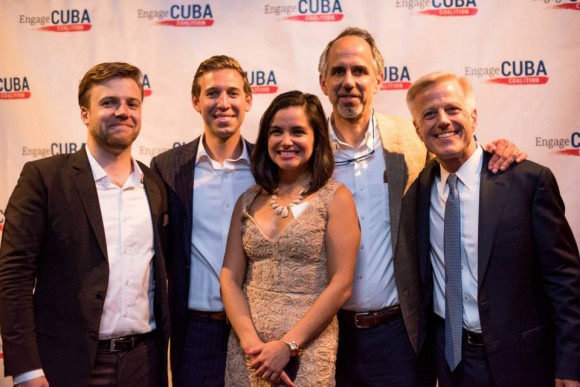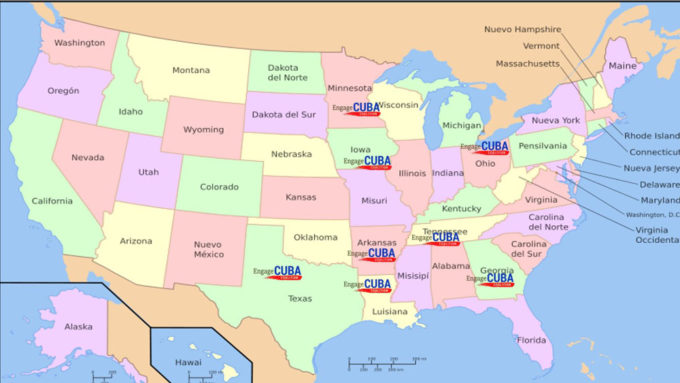
Engage Cuba: The end of the blockade is inevitable
HAVANA — When Michael Maisel (photo at top) was a child, in Philadelphia, he had a Cuban teacher, María de Orta. With her, he learned to speak Spanish and grew interested in Cuba. Today, Maisel is director of foreign affairs at Engage Cuba, an organization that advocates a lifting of the blockade and the freedom for all Americans to travel to the island and trade with it.
Some describe their members as greedy. “The only thing that hardliners can do is try to stop us,” has said James Williams, its president. The fact is that, 12 months after its founding, Engage Cuba maintains a rising trajectory and seeks to place in a single hand all the force toward the normalization of bilateral relations.
Maisel talked with Progreso Semanal about the group’s task and most immediate outlook.
This month (June) marks one year since the creation of Engage Cuba. How could we summarize its job so far?
We are very enthused, because within that year we have seen the reopening of the embassies in Washington and Havana. Agreements were signed on the environment, postal services, commercial flights and are being discussed about how to coordinate efforts against drug trafficking.
In addition, we have seen visits [to Havana] by trade delegations. Accords were signed, involving Starwood Hotels, AT&T and Verizon; AirBnB has been a total success on the island. I believe that in the next several months, after President Obama’s term ends, there will be more business accords.
The Helms-Burton Law still exists; however, we have seen more support in Congress, both in the Senate and the House of Representatives. For example, last week, a committee vote in the Senate passed four amendments in favor of normalization between the two countries.
From our perspective, in only one year there is much evidence of how close we have moved to normalization. We understand that there’s a lot more to do but we are confident, we are optimistic.

In the Engage Cuba team, a majority of the members are young. Is this by chance?
No, I don’t think so. We have two senior advisors; one is a Democrat (Luke Albee), the other is a Republican (Steven Law). They are not old but they are adults. We also have a younger team, and I think that’s on purpose, because we have much energy and a “post-Cold War” outlook. That is why U.S. policy toward Cuba makes no sense in the political reality we have experienced.
Do you define yourselves as a lobby?
No. To be a lobby, you need to have developed this activity for more than 20 percent of your time. We haven’t. Instead, we have hired the Republican group Fierce Government Relations to engage in that, to meet directly with members of Congress. What we do in Engage Cuba is to advocate a cause.
What methods do you use for that?
It’s as if it were a political campaign. In other words, once the blockade is lifted, we shall no longer exist. We are working ourselves out of a job, that’s the ironic point. The methods we use — in addition to working with Fierce Government Relations — are mobilizing the business community in the United States (especially in states that historically have a Republican majority) to change or influence their thinking on U.S. policy toward Cuba.
For example, we show a senator or a congressman from Alabama or Texas or Georgia that his state’s agricultural community could benefit economically if the government lifts the blockade. Then, that community speaks directly to its representatives to explain why it would be good to eliminate the blockade.
That is why we have launched the State Councils, as local sections of our organization, to mobilize people, leaders within the state who could influence their representatives in Washington.

There are State Councils in Minnesota, Ohio, Arkansas, Tennessee, Louisiana, and more recently Georgia, Iowa and Texas.
Yes. The next ones will be in Mississippi, Alabama and — at some point — in Nevada.
Why did you begin in those states and not others?
Each one has senators and congressmen who could be important in our strategy. In other words, we believe that they could be in agreement with our policy and want to show them that the voters in their districts are also in favor of that policy.
What happens is that, in our opinion, the majority in Congress is simply not very knowledgeable about the subject. But when they learn about the economic opportunities that exist or could exist with Cuba, they begin to rethink their positions and realize that this policy against Cuba has not achieved much in the past 50 years.
Are you planning to replicate these structures in all the states in the Union?
We hope to be able to lift the blockade before that becomes necessary.
There are other organizations that are also in favor of eliminating the blockade. What makes Engage Cuba different from those other groups? What relationships have you established among yourselves?
When we launched Engage Cuba, the idea was — and continues to be — to create an organization that could serve as an umbrella for all other organizations, to steer the ship where we all travel, because we all want the same thing.
Some organizations focus solely on human rights or business affairs or specifically on agriculture. Nevertheless, if they share with us the objective of ending the blockade they are part of our organization. They can join us and receive financial support from the business community.
The difference between Engage Cuba and the others is that we are among the only ones who focus on U.S.-Cuba relations and the only ones who have hired a lobbying firm.
Have you made contact with the Cuban authorities?
Yes, we collaborate frequently with the Embassy, with the ministries and also the state-run businesses. We don’t have the direct support of the Cuban or U.S. government; we are independent. Even so, we understand the importance of collaborating with both, so that this process may move forward.
For example, last week, one of our members in the business community, Choice Hotels, was here, meeting with the Tourism Ministry to explore opportunities. And we served as facilitators, as communications support.
In Cuba, a group like yours is sometimes seen in a positive manner, other times with suspicion.
Sure. We have always been welcomed here by the authorities, the Cuban society, the Cuban people, which we greatly appreciate. Nevertheless, we understand that there is a long history of mistrust toward U.S. entities.
That is why we try to stress that aspect of our organization: we are a campaign. The day we lift the embargo, we shall cease to exist. In other words, we have no other agenda. Although sometimes we support the businesses that come here, we earn not a cent from the accord that a Cuban firm signs with a U.S. company.
Researcher Jesús Arboleya has said that “because of the existing polarization between Democrats and Republicans, the recent creation of the bipartisan coalition Engage Cuba seems rather odd.” Would such a polarization be an obstacle to your work?
Our two senior advisors remain friends despite having opposite viewpoints on the policy. I believe that it is an example of how we could resolve this conflict that has existed in Congress mainly during the almost-eight past years.
Also, the issue of Cuba and the thaw between the two countries is something that the people want to see, in other words, it is an opportunity to maintain peace in our own hemisphere. While we see the news of conflict in Iraq, Syria — even in our own country — it’s nice to get some good news and observe that Republicans and Democrats can work together.
So far, it seems that one of the bills on free travel to Cuba is one of the most advanced, from the legislative point of view. What do you think might happen in the next several months?
Although there are several pending bills, it is not very likely that the Senate or the House of Representatives will vote either for or against one of those bills. What will probably happen is that the amendments approved last week in the Senate could be included in a very robust negotiation that will occur at year’s end. One of the amendments would effectively lift the travel restrictions to Cuba.
Another amendment likely to be included in that negotiation deals with the restrictions on the exportation of agricultural products to Cuba. What I mean is that the process to end the blockade will take place one step at a time. Eventually, the Helms-Burton Law will have to be repealed, but in the meantime other measures will emerge to clear the road.
So, is it a longterm process or something that has a ‘Day Zero’ when we can say, ‘starting tomorrow, it’s over’?
Both. Yes, it is a longterm process, but when I say longterm that could be in a year. And eventually there will be a Day Zero and that day is inevitable, in our opinion.
The Cuban side always claims that the measures taken by the Obama administration are of a limited nature. For example, Cuban artists and athletes can collect their earnings in the U.S. but, upon returning, they can’t pay taxes. And private businesses can export, but in Cuba it’s the state-owned businesses that export.
In my opinion, President Obama has done as much as he can within legal limits. Of course, the argument that his administration could do more can always be used. But the truth is that he has done a lot. Now it’s up to Congress to take action.

In January, you created a panel called Policy Council Advisors. What role does that group of experts have within Engage Cuba?
It depends on the individual person. What we wanted to do is almost the same as our principle: to make clear that different opinions, different perspectives exist but that, collectively, there is one opinion that everyone shares — it is time to lift the blockade.
And because we had included members of the American civil society, of the world of business, the trade organizations, we also wanted to include voices from the academic community, so that, when those experts talk about and do research on the U.S.-Cuba issue, they can give us advice.
It doesn’t mean that we are in agreement with everything they say, but we can count on their experience. I believe that we shall add more names to that group of advisors.
Cuba and the United States have never had a ‘normal’ relationship. What, to you, would normalization mean?
From the point of view of Engage Cuba, we are focusing specifically on the blockade. We understand that there are other issues that need to be resolved, but believe that the blockade is the first step to hold those conversations, to begin to strengthen a stage of real normalization.

